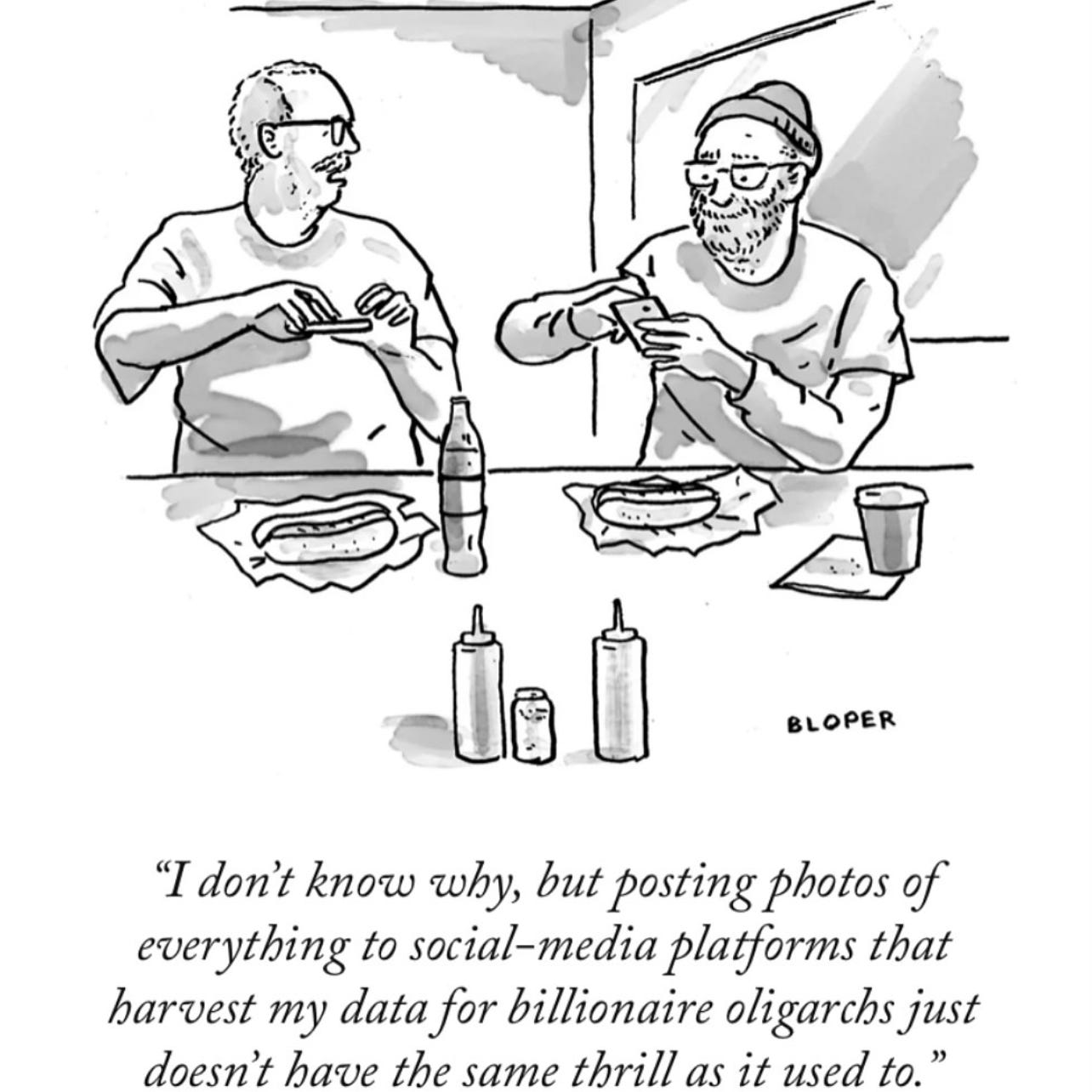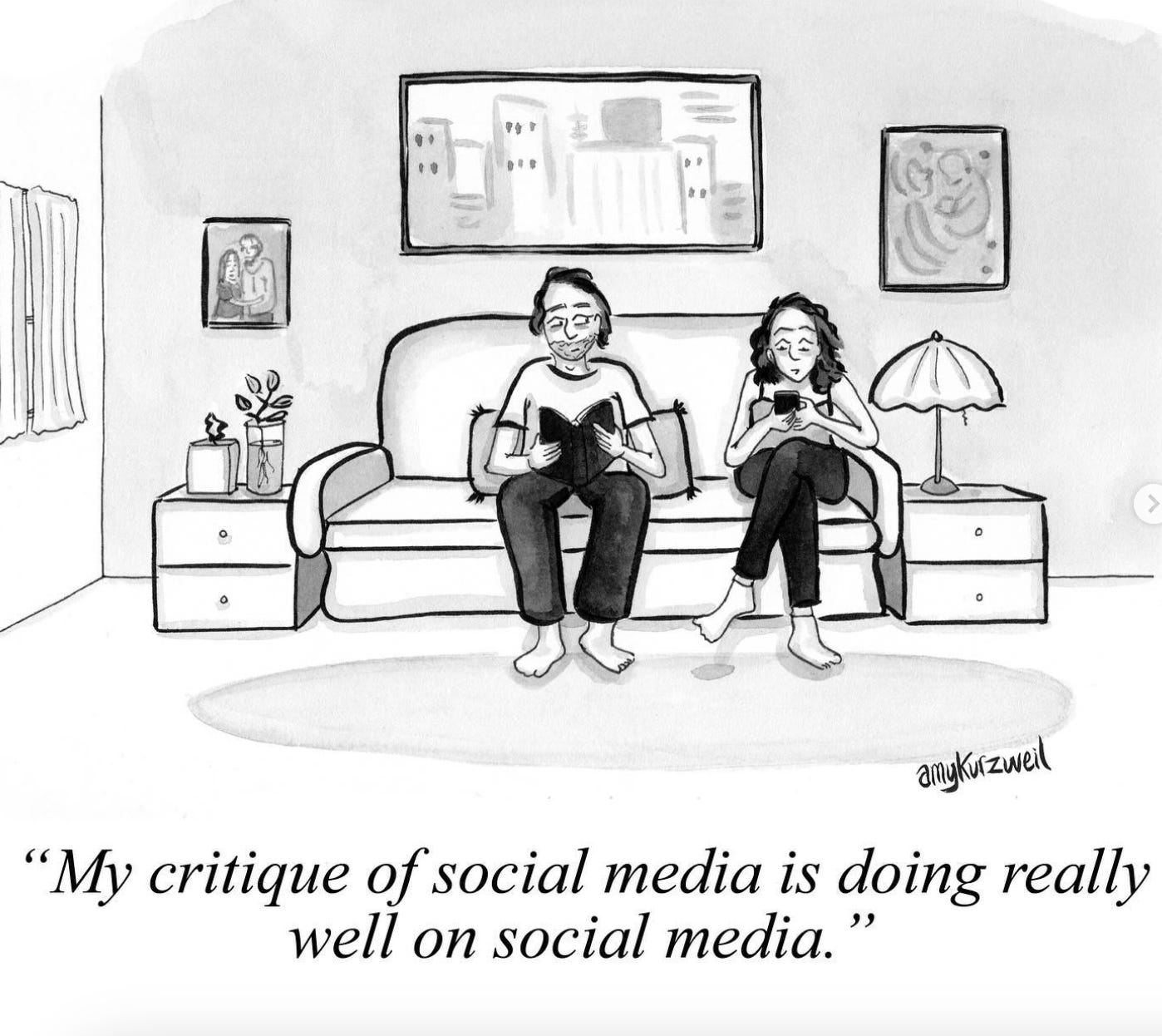New Instagram feature, same addictive design bullsh*t
Instagram's repost feature is just another attempt to win us back over and hack our brains
by Adele Zeynep Walton
If you asked me to pick my poison, Instagram would be mine. It’s my addictive app of choice - I love thinking up captions, reordering my photo dumps and commenting on virtual best friends’ pics. Being an online safety campaigner doesn’t make me virtuous, I’m just as hooked as the rest of us, and this is the app that’s had its hooks in my skin from the moment I clicked download at the age of 12. But this summer, I’ve gradually fallen out of love with the app that is my digital home.
I recently spoke on a panel at We Out Here Festival about the themes of my book Logging Off, and someone in the audience asked if it’s just them who finds it cringe to post on social media nowadays. Personally, I never struggled with this sense of cringe when it came to posting online, which would explain why I’ve shamelessly built up an archive of over 1500 posts over the past 14 years of my life. But it definitely isn’t just them who does feel this way - you only need to read this piece from Kyle Chayka or look at this genius cartoon (which yes, I shared on Instagram) to know that posting online is becoming a bit of an ick.
The chronically online and constantly looking down are now things we want to actively unlearn, not unconsciously embrace. Not just because we’ve finally realised how much time we waste on these platforms and how much attention they steal from us, but also because of the digital dictatorship they represent. Donald Trump’s inauguration was a pivotal moment which revealed how deeply intertwined Big Tech and the far right truly are, and it quickly turned many of us off. In the months that followed, many of us committed to being more intentional with our use of the broligarchy’s platforms, or ditched them entirely.
This collective unravelling of our personal relationships with social media has led to an increased public awareness of what we now understand to define Big Tech. Addictive and predatory algorithms, exploitative design and dark patterns, polarising and divisive feeds that fuel outrage, all upheld by surveillance capitalism. Social media has fallen out of favour, in the same way that we’ve seen happen with fast fashion. But of course, multi-billion dollar platforms won’t go without a fight, and whilst we might gather in these digital spaces to rant and critique social media barons, we have to remember they’re always listening, adapting, rebranding to stay relevant.
In comes the repost feature, something that many TikTok users adored and missed after it was removed (myself included). Introduced 2 weeks ago, the button adds an instantaneous way to boost other people’s content, so frictionless you barely notice yourself doing it. Last night I lost a few hours to passively scrolling after an emotionally intense day, and before I knew it I had reposted multiple things, mainly critiquing the very platform I was on. When I next logged on, I had a flood of notifications telling me that my followers had liked what I reposted - and there was it was. The reward, the incentive, the conditioning lever being pulled.
Here’s a snippet from my book that explains exactly how notifications hijack our brains to keep us online:
“Intermittent variable reinforcement is the psychological model that slot machines are designed on, and this is the same model social media apps are designed on too.2 This psychological process gives us rewards for our behaviour in unpredictable frequencies. In the 1950s, psychologist B. F. Skinner observed that lab mice responded most voraciously to random rewards, compared to lab mice that would receive the same reward every time they pressed a lever. The mice that received unpredictable rewards and sometimes none would press the lever more compulsively.
In the case of social media platforms, the rewards that keep us logged on and locked in are notifications and alerts. We are primed and conditioned by design to act out behaviours (scrolling, liking, commenting) in the hope of getting a reward that we don’t know what it will be. The inconsistency is what keeps us coming back. TikTok has mastered the art of this. The vast majority of my For You page isn’t of interest, but still, I’ll keep scrolling in the hope of getting lucky. In the case that I do see a video that interests, inspires or excites me, I unconsciously get a hit, which incentivises me to keep scrolling for more. Social media promotes a culture of bingeing because its design features – such as infinite scroll and autoplay – are created with the very purpose to addict us.”
Since notifications were designed to keep us hooked to social media, creating opportunities to notify us in new ways gives Instagram more changes to win us back over, to make us forget the reason we wanted to log off in the first place. What the repost feature means is that we no longer have to experience the *cringe* of posting in order to keep being active on the platform - we simply have to repost. At a time when being the person posting no longer feels as good, Instagram taken that out of the equation, finding new ways to keep us on the app, earning them their billions.
The repost feature is too easy, too irresistible, too effortless and that’s exactly what makes it so consuming. It’s a fast track hack to undoing the mental work so many of us have been doing to be less online, less dependent on external validation and less hooked to digital metrics. I’ve decided to stop using the repost feature and I think you should too.
To write a guest newsletter for us, get in touch: loggingoffclub@gmail.com
Adele Zeynep Walton is the co-founder of Logging Off Club and the author of Logging Off: The Human Cost Of Our Digital World.



